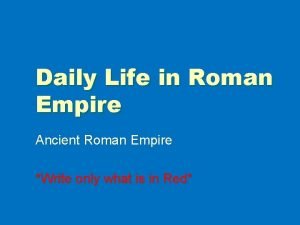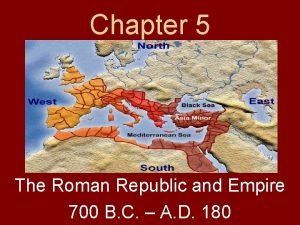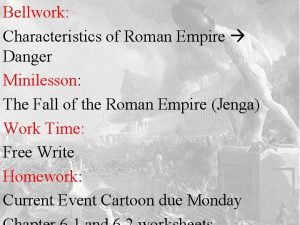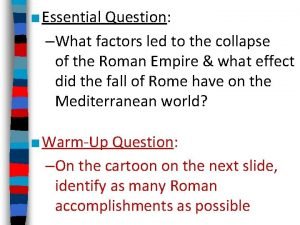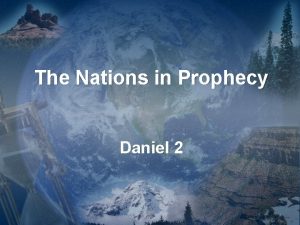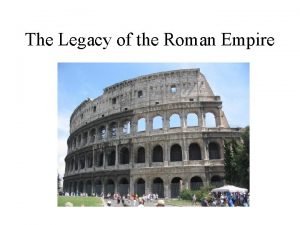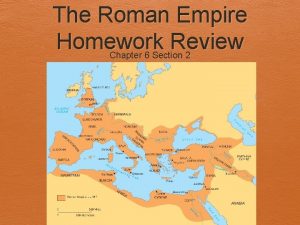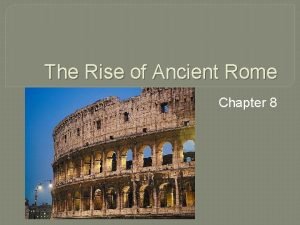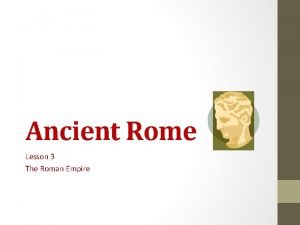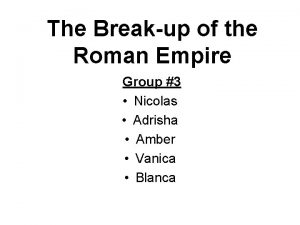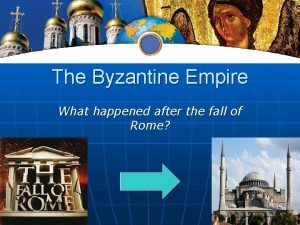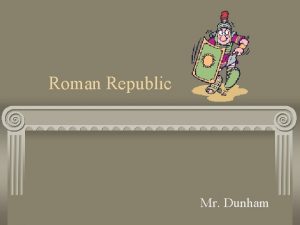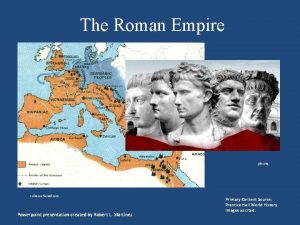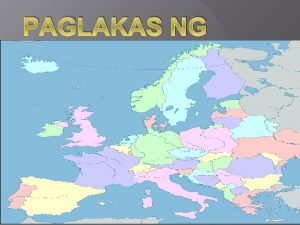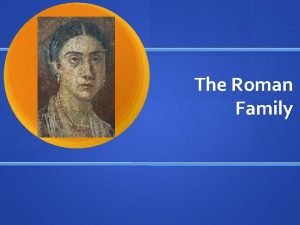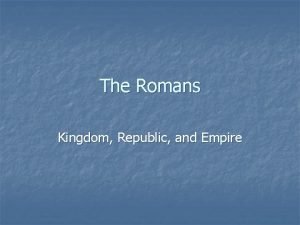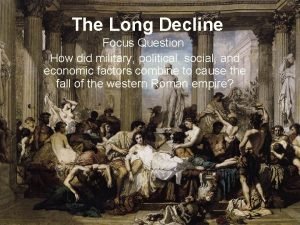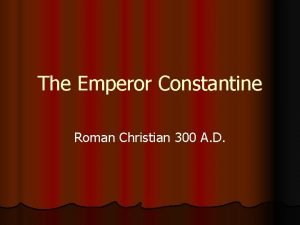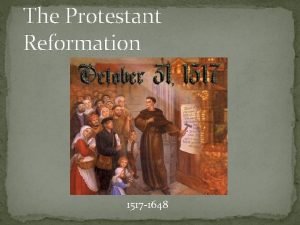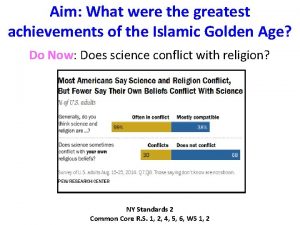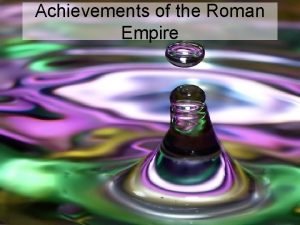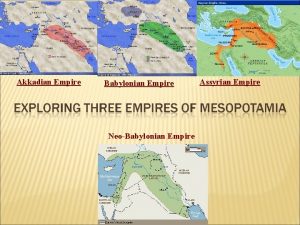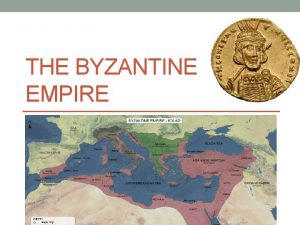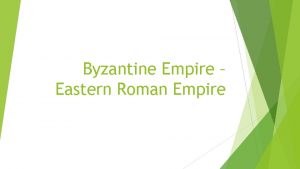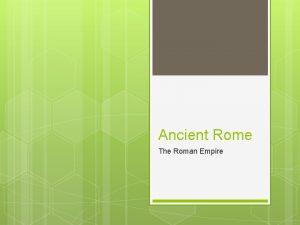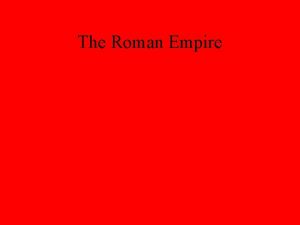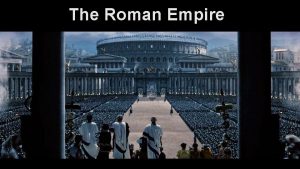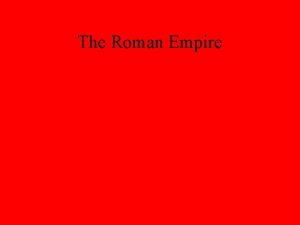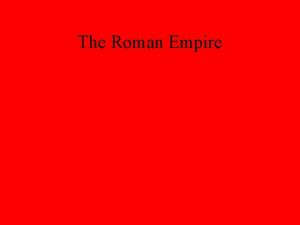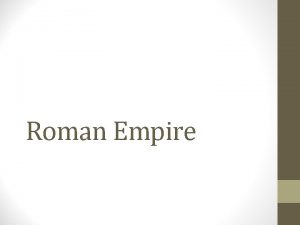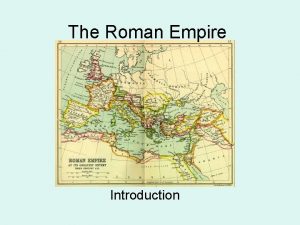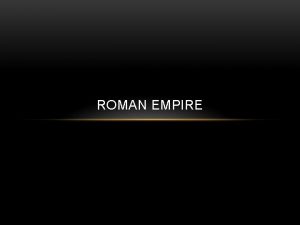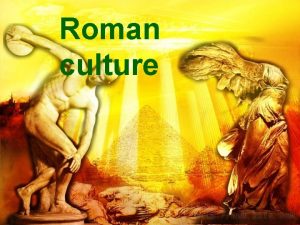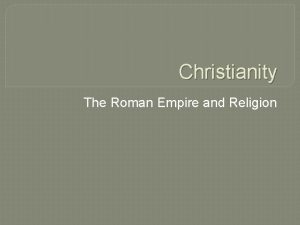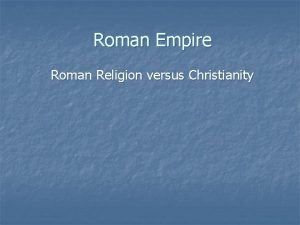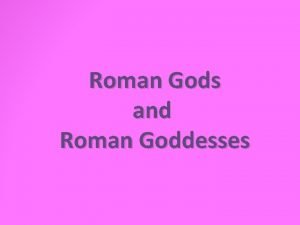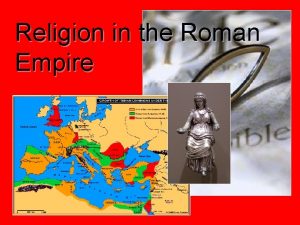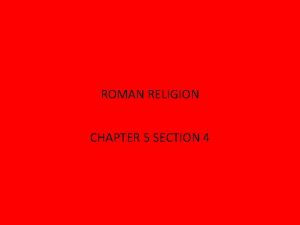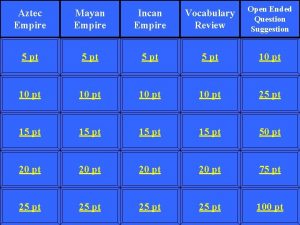Religion in the Roman Empire Religion in the





























- Slides: 29

Religion in the Roman Empire

Religion in the Empire • Early Roman religion: • Polytheistic • Heavily influenced by ancient Greeks • Linked closely to government

• Pantheon: • Temple to all Roman gods and goddesses

Religion in the Empire • Primary Roman Gods & Goddesses: • Jupiter – king of the gods • Juno – queen of the gods; goddess of marriage • Minerva – goddess of wisdom

The Emergence of Christianity

The Beginnings • By 63 BC Roman power had spread to Judea, home of the Jewish people • At this point Judea became part of the Roman empire

The Beginnings • According to Biblical tradition, God had promised that a savior known as the Messiah would arrive & restore the kingdom of the Jews

The Beginnings • A Jew named Jesus was born sometime between 6 & 4 BC; raised in the village of Nazareth • At about the age of 30, Jesus began to preach. His message included many ideas from Jewish traditions, such as principles of the 10 Commandments and belief in one God. According to Jesus’ apostles (close followers), he performed many miracles. His fame grew, and some believed him to believe the long-awaited Messiah.

The Beginnings • Taught disciples that people must love God, their neighbors, their enemies & themselves • “Blessed are the meek, for they shall inherit the Earth…” • Who would this appeal to? Why? • Who would this threaten? Why?

The Beginnings • In AD 29 Jesus visited Jerusalem • Enthusiastic crowds greeted him as the Messiah BUT… • Jewish leaders denied that Jesus was the Messiah • Roman governor, Pontius Pilot, accused Jesus of defying Roman authority & sentenced him to death

The Spread of Christianity

Spread of Christianity • According to the Gospels, Jesus rose from the dead and ascended into heaven • Followers became known as Christos (Greek word for messiah)

Spread of Christianity • Jesus’ followers came to be called Christians. Led by Peter, the first apostle, they spread his teachings throughout Palestine and Syria. At first Jesus’ followers were all Jewish. Later, under one apostle, Paul, Christians began to look to all people, even non-Jews, to join the church.

Spread of Christianity • The apostle, Paul, helped spread Christianity • Wrote letters about Jesus; helped convert non-Jews

Spread of Christianity • How did the organization of the Roman Empire help the spread of Christianity? • Excellent Roads (easy to move around) • Common Languages (Greek & Latin)

Spread of Christianity • Christianity first appealed to the poor • Offered salvation & provided hope for a better life • Emphasized equality • Embraced ALL people

Early Christians in the Roman Empire

Early Christians • Roman Leaders DID NOT like Christianity • Threatened their rule • Did not worship Roman gods • Used Christians as scapegoats for political and economic problems

Early Christians • In the summer of AD 64, there was a large fire in Rome that burned uncontrollably for weeks. The Emperor, Nero, blamed the Christians for the fire and many were sent to the games to be torn apart by wild animals for the entertainment of the people of Rome – 600 were even arranged around the top of the Colosseum in Rome, set on fire to serve as “stadium lights. ”

Early Christians • What happened to early Christians? • PERSECUTED & PUT ON TRIAL • If one was found guilty of following Christian beliefs he/she had 2 choices…

Early Christians • Choice #1: • Deny beliefs & live • Choice #2: • Refuse to deny beliefs & be put to death

Early Christians • Persecution of Christians ended in AD 313 when Emperor Constantine granted the freedom of worship & religion to Christians

Early Christians • In AD, 313, Christianity entered a new era. The Roman emperor Constantine said that Christians would no longer be persecuted. Constantine, a general in 312 AD, reported that just before a crucial battle he had a dream where he saw they symbol of the Cross in the sun, and was told to paint this symbol on his soldiers’ shields to ensure victory. He did this and won the battle, and decided in thanks that he would allow the whole empire to worship any religion freely. Constantine himself later converted to Christianity.

Early Christians • In 380, the Emperor Theodosius made it the official religion of the Roman Empire • What do you think happened to the Pantheon?


In a Nutshell…

The Basics • Founder: Jesus Christ, son of God • Sacred Text: Bible • Symbols: Cross, Fish, Dove • Leaders: Priests, ministers, monks, nuns, etc.

The Basics • Three Major Groups: • Roman Catholicism • Protestantism • Eastern Orthodox

The Basics • ONE God; personal relationship to each human being • Jesus Christ died to save humanity from sin • Eternal life after death
 Byzantine empire vs roman empire venn diagram
Byzantine empire vs roman empire venn diagram Politheistic
Politheistic Roman republic vs roman empire
Roman republic vs roman empire American empire vs british empire
American empire vs british empire Mauryan empire and gupta empire venn diagram
Mauryan empire and gupta empire venn diagram Constatntinople
Constatntinople What factors led to the rise of the roman empire
What factors led to the rise of the roman empire Revived roman empire
Revived roman empire Legacies of the roman empire
Legacies of the roman empire Golden age of the roman empire
Golden age of the roman empire Roman empire in first century
Roman empire in first century Lesson 3 the early roman empire
Lesson 3 the early roman empire Break up of roman empire
Break up of roman empire Roman empire divided
Roman empire divided Rome's greatest achievements
Rome's greatest achievements Eastern and western roman empire map
Eastern and western roman empire map High empire roman art
High empire roman art Location
Location Pbs roman emperors
Pbs roman emperors Mga pangkat ng bourgeoisie sa europa
Mga pangkat ng bourgeoisie sa europa Ancient rome family life
Ancient rome family life Romes location
Romes location How did the hun invasion weaken the roman empire?
How did the hun invasion weaken the roman empire? Why did rome fall
Why did rome fall Roman empire in 300 ad
Roman empire in 300 ad Calvinism map
Calvinism map What are the key achievements from the islamic golden age
What are the key achievements from the islamic golden age Achievements of rome
Achievements of rome How is specialization connected to interdependence
How is specialization connected to interdependence Diocletian split roman empire
Diocletian split roman empire
